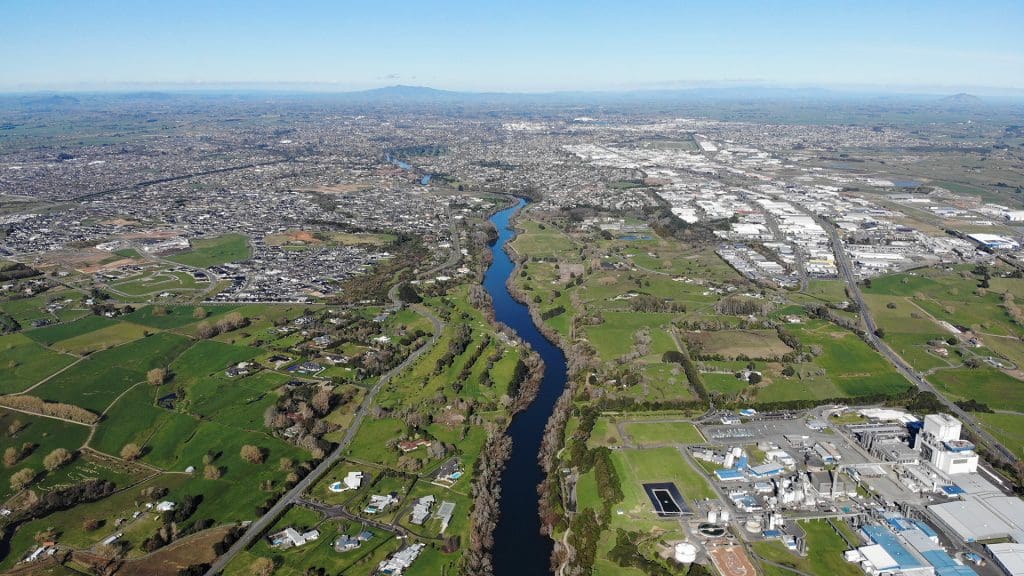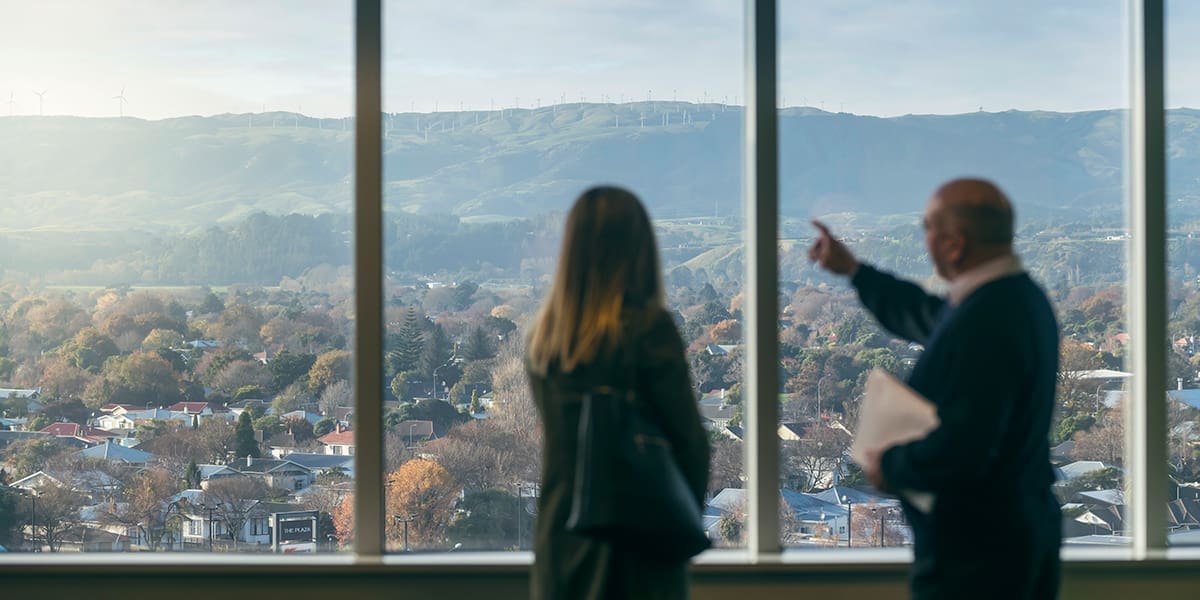Investing In The Next Chapter With Commercial Property
We seem to be getting daily headlines about exorbitant prices paid for Auckland villas at the moment. But while residential investment might be getting harder, many people are finding new opportunity in the world of commercial property outside of the main centres.
With a career spanning property finance, development and sales, Waikato/Bay of Plenty Property Brokers Commercial Manager Alan Copeman is on the coalface of the commercial market in the Waikato region. We talk to him about how to make the shift into commercial, growth areas for the economy, and the Waikato’s hidden gems.
Obviously residential property is in the headlines at the moment, but what’s happening over on the commercial property side? Are you seeing a bit of a shift from the residential landlords over to a different type of investing?
The recent residential changes have resulted in a marked upswing in commercial space interest. People are looking to buy commercial and industrial property because they see it as a good, safe investment. Additionally, there’s a lot of businesses leasing large industrial buildings that are certainly coming back into the market since COVID. A lot of that’s probably because they’re expanding their operations in New Zealand because they can’t necessarily import stuff from overseas, so they’re getting the benefit of that.
It must be interesting to see the sectors that are starting to boom at the moment; our internal supply chains, maybe the tech sector as well with some discussion about data. Are you noticing that there is this sector shift as well?
Yeah, there definitely is. I think what you’re starting to see is provincial New Zealand is coming back into flavour with investors. A lot of those provincial places in that retail space, and even office and industrial, there’s very low vacancy rates.
You’re starting to see a bit of a shift, especially in the Waikato area where Auckland companies are looking to relocate their operations down into the Waikato, and that’s putting pressure on the market and creating that price increase.
If you look at places like Tokoroa, for example, it has incredible logistic potential, good infrastructure, but really cheap commercial property. Are you seeing places like that starting to shift as well?
Yeah, definitely. I cover Waikato and Bay of Plenty, and with little places, like Whakatane, I’ve probably got a list of 10 people looking for retail space. There’s no industrial buildings available for lease, and most of those little places, like Matamata or Morrinsville, all of those retail shops are chocka and you’ve got a waiting list of people, which is interesting in the current environment.
What do you think is driving that? Is it a lifestyle change, where people are wanting to get out of the main centres for a bit more space and then alongside that, they’re getting into business?
Yes, we’re certainly seeing that. For example, the last lockdown, Waikato carried on business as usual and Auckland was unfortunately locked down, and the businesses were back to not operating.
People are just looking at whether they can relocate purely for lifestyle. They put some money in the bank, get a business that they can operate, have that flexibility, and get just as good a return without being locked into those main metropolitan centres.
Do you think it will start to be easier to invest in commercial property? Are banks going to look at how they’re allocating some of their capital?
Yes, I think they possibly will start to revisit that. I think in the current market, you’re probably getting a better return in that commercial space than you are residentially. We’ve got investors that say, residentially, they’re at 3.5-4% because of where the market’s value in those properties has gone. Whereas, with commercial, you can still pick up a 5 or 6% return. So, you are, in some cases, probably getting twice the return, and there’s a lot fewer restrictions on that commercial space.
With the new Residential Tenancy Act, it makes it really difficult for landlords. People are taking their money away from that residential space and parking it into some of those lower-value commercial investments. You can pick one up for $500,000 and you’re getting a $30,000 return. We are starting to see a big shift in that happening.
It’s still so hard to get funding for commercial, you’re just treated differently than you are with residential. From your banking background, do you think that there is going to be an ease up there on the commercial side?
I’d like to think so. You’ve usually got to come up with a 40% deposit on commercial when you’re on your own. Because that residential market headed that way, you’d like to think that banks may start to look at doing 70-75%.
Back in the day when I was at the bank, they used to look at those numbers and then they really tightened up and went away from it. I think if you’re getting some good blue chip investments, it would be good to see them start to relax that again and start to encourage people back into those markets with a lower deposit.
With some of the returns that you’re getting from residential, it wouldn’t surprise me in Auckland if you’re getting 1.5-2% in some places.
Oh yeah. Especially when you take on what the value of the houses have done in the last six to 12 months, the returns are probably similar to being in the bank.

If you’ve got a couple of residential properties and you’re wanting to make the shift over to commercial, is there any advice that you would give for people entering that side of things?
I think the main thing with commercial property is to do your homework on the tenants. Understand things around how long the tenant has been in business? What sector are they in? What’s the likelihood of any pandemic impacting their business?
If you want a good, safe, secure investment, you’ve just gotta make those decisions. That’s why I think a lot of people are heading to that industrial sector because they’ve seen that the past 12 months haven’t really impacted on those production and manufacturing sectors. If anything, it’s probably strengthened them.
Are you finding that there is an incentive for businesses to start up in the regions because residential property is cheaper for their workforce as well? It means that they can have a better quality of life and it’s more accessible.
Yes, there is. An example of this is an Auckland manufacturing business looking to relocate to the Waikato, with them also purchasing a residential property down here.
If we go back to this time last year and we’re starting to get a lot of the headlines around how things are going to be falling off a cliff, property prices going down and mass unemployment, would you have expected that we would be in this position now?
I think provincial New Zealand has probably bounced back a lot better than the larger centres. It’s been a combination of a lot of people shifting out of those areas simply because they don’t want to be locked down or have their business operations hindered.
I think people have also taken stock, and a lot of people probably did get laid off in certain sectors and they’ve sat back and thought, from a lifestyle point of view, ‘I could have a business in a provincial town, have a bit of money in the bank and have a total lifestyle change.’
You wouldn’t have expected that 12 months ago because the main centres were the ones that held the rest of the country up. But I’ve seen a real shift of that over the last 12 months where I talked to colleagues in Auckland, and they’re certainly nowhere near as busy in that commercial space as what we are.
You’ve done a bit of property developing along the way?
In the past, I did a little project in Auckland with an apartment complex and then worked for a couple of large format developers to do a couple of large coastal developments, one in the Coromandel and one in Queenstown. I’ve had my finger in that pie over the years.
It’s been good because it gives you a good grounding for when you’re looking at projects and properties now, you can look at how a developer might look at it, and it certainly anticipates and helps when you go to sell the projects.
Do you miss that work?
Sometimes I do. I still like to dabble in it a little bit, and I’m fortunate to have a couple of clients that do a bit of that stuff, so I still get to go along for the ride nowadays. It is fun.
Any advice for budding property developers who are looking to get into the game?
It’s all about doing your homework and just making sure that you’ve dotted your I’s and crossed those T’s. The big thing with developments is really making sure that you’ve got your exit plan in place. You make your money when you buy the property, not necessarily when you sell it. It’s all about making sure you buy at the right price.
Going back over to the residential side, there’s been some crazy prices paid for property with very big sections. As a developer, would you be looking at that type of thing in the market currently?
At the moment, if I was in the position to get back into that development game, I’d be looking at land around city fringe areas, that is rural land today, but potentially in the next three or five years can be rezoned.
I think that’s where you’ll probably see the biggest opportunities, simply because you’re buying land at a wholesale price in effect, and then when the zone changing goes through, you’re going to see an immediate lift in the values of those properties. That’s all driven by that residential property market. That’s where I’d be focusing.
Any hot tips for the Waikato or Bay of Plenty region in terms of hidden gems?
Just out of Cambridge is a big industrial park and big chunks of land in Hautapu. I think that’s probably an area where you’ll see some real growth over the next two to three years.
Some larger companies, like APL, are relocating to Hautapu and are currently building a 45,000 square metre factory.
Do you have a sense of any growing sectors for the New Zealand economy, based on what you’ve seen?
I still think over the next two to three years, that industrial space. You’ve seen it over the past few years with how the Auckland Airport sprung up with all the industrial space. I think that’s flowing on now, to that Golden Triangle area of Hamilton and Tauranga.
With all the money invested in the expressways and infrastructure between Auckland and Hamilton, I think you’re going to see that those outer areas of Hamilton are probably going to benefit quite a bit from that, which will be those big industrial parks.
The world of syndication has opened up commercial property for retail investors quite nicely. Has that created a whole lot of liquidity? Has that created a whole lot of movement in the market as well, from your perspective
Oh, definitely. I think you’ve seen over the last 10 years, there’s been quite a significant growth in that syndication market. People get the benefit of only putting $50,000 or $100,000 into a property and someone manages it, and they get a good return. It can be from 5-7.5% return.
If you don’t like share markets or bonds, that’s a good alternative to that. People know that it’s a good, safe investment. I think syndications will continue to grow. Their biggest challenge is probably securing the product to be able to offer to those investors.

From your perspective, was the uncertainty from last year a difficult thing to get through? Did it test you as a leader?
Yeah, it certainly did, especially through that first lockdown period. We talked every week as a team, but there were periods where literally your business had shut down, and you had to re-boot it and kick into it again.
I think we were quite lucky. Our team took that as an opportunity to see where we were in the market with our competitors, and we hit the ground running when we came out of lockdown. We’re really starting to talk to all our vendors a couple of weeks out. A lot of them were saying that they hadn’t heard from their agents the whole time that they were locked down. We took it as an opportunity, but it was certainly tough.
In terms of the concept of competition, what sort of metrics do you work with? Obviously getting a great price for your vendor is one thing, but how else do you compete?
We try to build our relationships with the key players in our markets and the provincial towns. We pride ourselves on being available to those clients all the time. For example, I look after Cambridge and adjacent areas, and in those places, a lot of the property has been held by the same vendors for a long time.
You’ve got to build those relationships and keep talking to each one of them. The key thing is, if you have got a property coming to the market, you’re putting it in front of all of them, and you’re not just sharing it to the same people all the time. It really comes back to that whole relationship philosophy, which is one of the key things in real estate.
When you’ve got a young agent coming along, how do you know that they’re going to be good? Is it the people skills or are there other things as well?
It’s the people skills. There’s a lot of cold calling in real estate. I always say to them, ‘what’s the worst thing that can happen? They’re going to say no to you? Well, that’s not going to hurt your feelings.’ You’ve just got to hang up, and make that next call.
Why are we so afraid of cold calling?
I’m not sure. I quite like the cold calling. I like the challenge that it presents. If someone doesn’t want to talk to you, you’re always polite and say, ‘Hey, thanks. If you do want to use me, here are my details.’ I think it’s that fear of rejection probably, and people are worried that someone’s going to abuse them. But 95% of people aren’t like that, so the fear of rejection is probably in the mind.
Have you noticed that things have changed? Maybe some of the older techniques that might’ve worked 10, 15 years ago, people start seeing through some of that?
Yeah, I think so. I don’t do letters or any of that sort of stuff now. I pretty much just pick up the phone and ring somebody. I think people are starting to learn all those tricks now because unfortunately with what’s happened in that residential market, they’re probably getting a call every week or a letter in the mailbox all the time.
I think your vendors have become smarter. They Google who’s doing what business in town. It’s also that old adage of, if your sign is up everywhere, there’s that perception that you do all the business.
How do you describe yourself as a leader?
Sometimes people will say I’m too generous. I’m happy to bring someone in on a transaction to help get it across the line. I always say that if you’re involving other people in the transaction and using their skills to help get a deal done, it’s a lot smarter than trying to do it all on your own.
Recently I had an old farmer who I was trying to convince to list his property with me and he just wouldn’t have a bar of it. I got one of our rural agents involved, and lo and behold, we listed it, and sold it within a week. It’s about being able to identify someone else’s strengths that’ll help get a deal done. That’s the strength of Property Brokers. We all work as a true team.
That can be a bit of a hit to your ego right, if you’ve got to learn how to step back a little bit?
Everyone wants to do the whole thing themselves but I’m driven more by getting a deal done than the financial reward of the deal. I love doing deals.
What’s the best piece of advice you’ve been given?
Around property, if you are in a position to keep any property that you purchase, and not sell it to move forward to the next one, that’s probably the best piece of advice. If I look back at all the properties that I’ve owned, and what’s happened to them now, I’d be a wealthy person. If you can afford to keep your properties, certainly do so.
To find out more about investing in commercial property, visit Property Brokers website, or for more similar content, head to the M2 Better Lifestyle Channel here.

